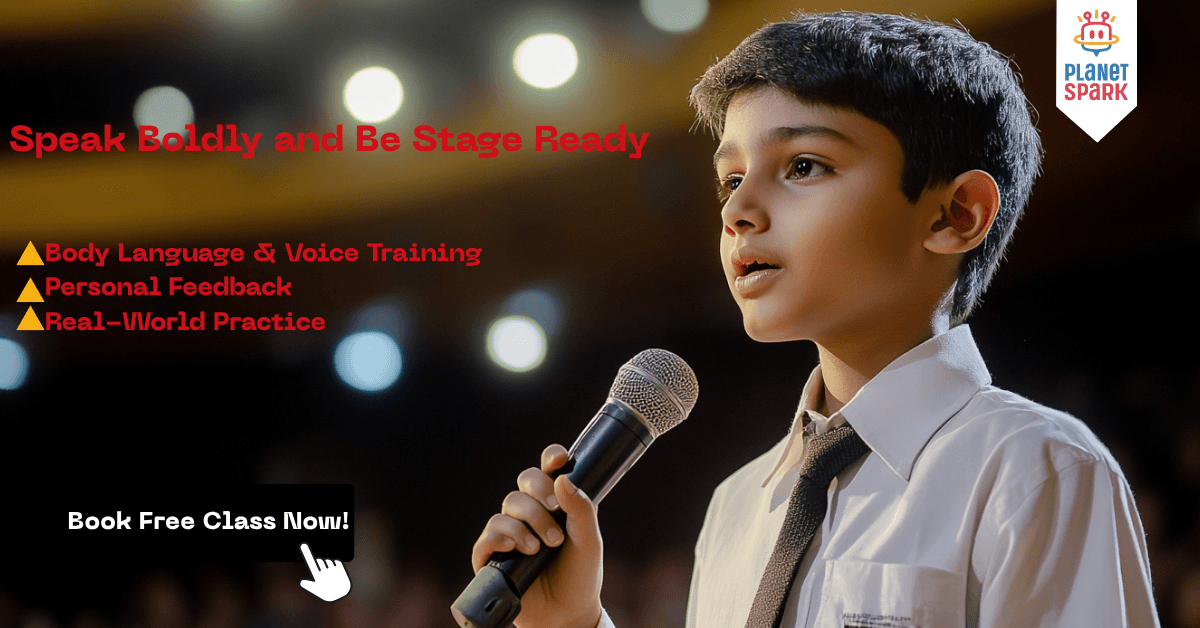Public Speaking for Kids: Tips to Build Confidence Early

Table of Contents
- What is Public Speaking
- Everyday Public Speaking
- Why do kids Need Public Speaking
- Influence the Audience
- Develop Leadership Skills
- Enhance Communication Skills
- Inform Effectively
- Develop Social Skills
- Advance in Career
- How to Improve Public Speaking for Kids?
- Advantages of Attending Courses in Public Speaking for Kids
- Conclusion
- FAQs:
Most of us feel butterflies when called upon to speak in public. It is natural for kids too to feel nervous at the opportunity of addressing a room full of people. This is why it is essential to enhance public speaking for kids in their elementary years so they get ample time to master it. Having excellent communication skills will take your child a long way. Communication is the backbone of our society. This life skill is essential in every walk of life. Mastering public speaking for kids will help them build important connections, enhance personal relationships, and motivate changes in society. Before diving into the ways of improving public speaking for kids, let’s take a closer look at what exactly is meant by public speaking.
What is Public Speaking
Public speaking is presenting your thoughts in front of a crowd. Merriam-Webster defines public speaking as “the art of effective oral communication with an audience.” Everyone has to address an audience at some point in their lives - at school, the workplace, or in everyday life. Public speaking for kids is a crucial skill that turns them into confident speakers. When children acquire these skills early, they gain an immediate edge over others.
Everyday Public Speaking
Informative: You may have noticed when your boss informs you about a project or when you present your progress report in a meeting. These daily life experiences are examples of informative speaking. It involves sharing any kind of information with others - like academic lectures or public announcements.
Persuasive: Persuasive speaking typically occurs in formal speeches or debates where speakers argue to convince their audience. But we use persuasive speaking in everyday life, too. Deciding where to eat or which destination to choose for a trip also involves persuasive skills.
Entertaining: When the speaker’s goal is to entertain rather than inform, public speaking becomes a tool for amusement. This includes story reading, poetry reciting, stand-up comedy, or hosting events.
Why do kids Need Public Speaking
The main purpose of public speaking courses for kids is to enhance their communication skills early on so they can express their thoughts and ideas clearly. Communication often involves persuasion to influence a group. So, public speaking for kids prepares them for the next stages of life.

Influence the Audience
The primary goal of communication is to clearly express thoughts. Public speaking for kids equips young minds with persuasive techniques, helping them influence audiences effectively.
Develop Leadership Skills
We all know leaders whose bold ideas have motivated others. Speaking in public demonstrates bravery and leadership. Early training allows children to share ideas with confidence and build a strong foundation.
Enhance Communication Skills
Public speaking courses focus on both verbal and non-verbal communication to shape children into effective speakers. These skills are essential in daily conversations, social interactions, and career advancement.
Inform Effectively
It's not just about what you say, but how you say it. A boring delivery can ruin great content. Public speaking courses help kids develop engaging communication from the start.
Develop Social Skills
Public speaking encourages interpersonal interactions. It prepares children to confidently engage with others, make connections, and build strong personal relationships.
Advance in Career
Public speaking gives children an edge in high school, college, and beyond. Confident speakers won’t shy away from interviews or pitching ideas.
How to Improve Public Speaking for Kids?
Public speaking is a skill acquired through regular practice. There are many enjoyable ways to improve public speaking in kids.
Five Effective Ways to Improve Public Speaking for Kids
- Games and Activities
Fun games can boost confidence and communication.
- Connect the 'nouns': Children link three random nouns to build a story.
- Speak your mind: Kids read a few lines and freely talk about it.
- Describe what you see: While out and about, kids describe their surroundings in English.
- Make up a definition: Kids define unfamiliar words to build authority.
- Alternative Ending: Kids create a new ending for a familiar story.
- Public Speaking Apps on the Phone
Useful apps include:
- Orai: Voice recognition offers feedback on clarity and tone.
- Six Minutes: Vocabulary and grammar lessons in short bursts.
- Zoom.us: Kids learn better in groups.
- Book Widgets: Interactive worksheets for real-time feedback.
- SpeakerClock: Helps children manage time while speaking.
- Ummo: Analyzes speech for filler words and clarity.
- Watch TED Talks
Watching experts and children speak on stage enhances critical thinking and curiosity. Seeing peers present confidently inspires kids to do the same.
- Movies
Turn movie time into learning time.
- Movie Break Down: Kids summarize films in three parts.
- Tell Me What You See: Kids describe scenes without visuals.
Recommended Movies:
- The King’s Speech
- Larry Crowne
- Kid President
- My Fair Lady
- Public Speaking Courses for Kids
Some kids are natural speakers, while others need guidance. Public speaking classes help overcome shyness and build self-assurance.

These classes help children:
- Build communication skills early
- Practice with peers in group activities
- Gain professional coaching and feedback
Public Speaking Topics for Kids
- My Dream Career
- If I were the President
- The best day of my life
- My favorite pastime and why
- What I would change about school
- My favorite subject
- Importance of games and physical activity
- The funniest movie ever
- If I could talk to animals
- If I had a superpower
- Why I love my parents
- My favorite food
- The best part about living on Earth
- Choosing my planet
- What my dog is thinking
Tips to Prepare:
- Teach voice modulation
- Focus on pace and tone
- Encourage confidence
- Practice eye contact
- Use expressive body language
Advantages of Attending Courses in Public Speaking for Kids
- Battle Fear Courses include engaging tasks that help kids overcome stage fright.
- Voice Their Opinions. Even shy kids learn to express their thoughts freely.
- Improving academic Performance, and Public speaking promotes active listening and classroom participation.
- Develop Self-Control Group activities to teach collaboration and social discipline.
Conclusion
Public speaking for kids is an essential life skill that can transform them into confident communicators. Like every other art, public speaking requires plenty of practice. Starting early makes it easier for children to master techniques such as voice modulation, active listening, and effective body language. Public speaking courses for kids include engaging activities and professional mentorship to shape their learning journey in the best way possible.
FAQs:
1. How do I assist my child in public speaking?
Ans. Begin early, engage them in conversations, allow them to express opinions, and provide positive criticism.
2. What are five public speaking tips?
Ans. Choose a subject you enjoy, practice extensively, imagine your audience, remain calm, and be clear in your speech.
3. What is public speaking for children in elementary school?
Ans. It's developing children's verbal and non-verbal communication to be effective communicators.
4. What is public speaking in a few words?
Ans. It's speaking out clearly before an audience confidently.
5. What is learned in public speaking?
Ans. Voice control, body language, eye contact, structuring of speech, and engagement with the audience.
Personalized Communication Report
Record a video to get a AI generated personalized communication report for your child

Hi There, want to try these
tips for your child with
LIVE with our expert coach?
Let's check your child's
English fluency
